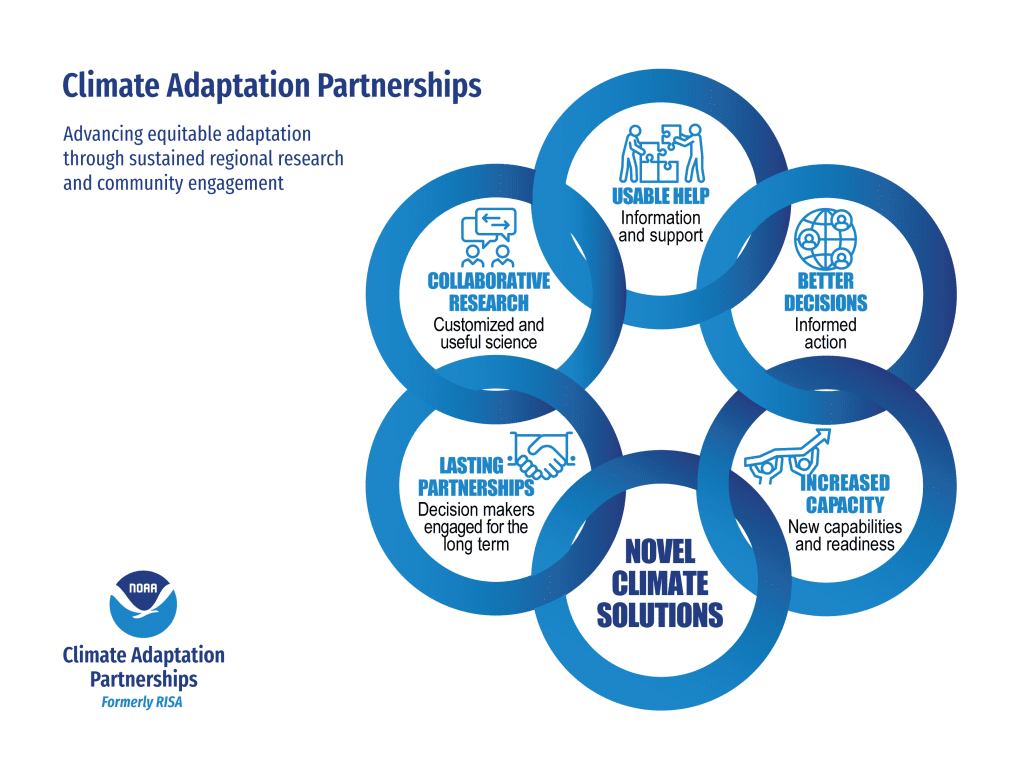About CAP/RISA
NOAA Climate Adaptation Partnerships (CAP) / Regional Integrated Sciences and Assessments (RISA) program is an applied research and engagement program that expands society’s regional capacity to adapt to climate impacts in the U.S. The CAP/RISA program supports sustained, collaborative relationships that help communities build lasting and equitable climate resilience. Funded by 5-year cooperative agreements with NOAA, the work is accomplished by teams of research institutions, nonprofit organizations, and state/local/Tribal governments in multi-state regions. CAP/RISA teams engage in a variety of applied and co-developed research and engagement with communities. A central tenet of the CAP/RISA program is that learning about climate adaptation and resilience is facilitated by and sustained across a wide range of experts, practitioners, and the public. Learning about and doing adaptation happens within social contexts. As such, the CAP/RISA program supports networks of people working together to plan for and adjust to change using science and local knowledge.
Why is NOAA changing the name of the RISA program?
In 2022, Congress directed NOAA to change the name of the Regional Integrated Sciences and Assessments (RISA) program to “Climate Adaptation Partnerships (CAP).” This new name is fitting for the program as it exists today. “Climate” acknowledges the program’s focus on long-term change and variability. “Adaptation” encompasses approaches to reduce negative impacts of climate change and maximize emerging opportunities. “Partnerships” refers to the web of collaborative relationships between researchers and community decision makers within the regions. It also refers to the larger connections among regional teams that support the peer-to-peer learning that builds local capacity and expertise for national impact.
Early decades of the program focused on understanding the use of climate information at regional scales (e.g., through experimental seasonal outlooks), improving predictions and scenarios, building capacity for drought early warning, and advancing the science of climate impact assessments. Much of this work is now the focus of other federal programs. More recently, emphasis has shifted to address the growing urgency to advance approaches that tackle the complex societal issues surrounding adaptation planning, implementation, and building community resilience that incorporate the intersection of multiple natural hazards and social stressors. To do so, CAP/RISA continues to prioritize and fund collaborative approaches that incorporate multiple knowledge sources and integrate social, physical, and natural science, resulting in long-term support of and increased capacity for communities. In addition, CAP/RISA supports cutting-edge social science on the impacts of climate change on communities, challenges and opportunities for adaptation, and inclusive methods of engagement. As the adaptation community in the United States advances and evolves, CAP/RISA seeks to support new creative, solution-oriented approaches that are both responsive to communities and that integrate across silos of scientific knowledge and expertise.
Central to achieving the CAP/RISA mission are:
Regional Relevance, Local Expertise
CAP/RISA teams carry out a variety of projects focused on regional issues related to climate change and extreme weather. These projects span disciplinary, sectoral, environmental, and social concerns, but are rooted in bottom-up expressions of local need. In order to build trusted partnerships to address these needs, CAP/RISA teams are composed of place-based experts from universities, non-profits, and other organizations commanding local knowledge and engaged with community solutions.
Integrated Scientific Approaches
CAP/RISA teams generate cutting-edge and applied interdisciplinary research on the impacts of climate on communities. CAP/RISA scientists develop unique ways of bringing together natural, physical, and social sciences around complex climatic concerns related to human-environmental interactions. CAP/RISA teams generate new scientific knowledge of how broader contexts for risk and resilience shape the successful implementation of adaptation strategies, resiliency plans, and risk-reducing activities. This work includes understanding the social and cultural impacts of climate change, governance structures, laws, and fiscal policies that shape climate adaptation and implementation processes, and how this impacts equitable adaptation strategies.
A National Network of Resilience Researchers and Adaptation Science Specialists
Relationships across CAP/RISA teams ensure that information and expertise are shared between regions to develop national capacity to adapt to climate change. This network not only spans the CAP teams but also draws upon other NOAA entities and federally-funded state and regional partners, where relevant. This network ensures best practices, data access, coordinated efforts, and leveraged funding. CAP/RISA teams also build the network through education and professional development, engaging a variety of early career professionals, including students across undergraduate, graduate, post-graduate, and continuing education/professional levels in learning and mentoring activities that equip them to effectively address climate variability and change in the workforce.Knowledge-to-Action Partnerships
CAP/RISA teams engage in co-production and other processes for working across organizational lines, and include scientists, cooperative extension and outreach professionals, local planners and decision makers, community members, and communicators to ensure knowledge-to-action tools, technologies, and other products that increase capacity for making decisions in a rapidly changing environment. The experimental and innovative nature of CAP/RISA teams extends beyond “snapshot” assessments, tools, or other products alone. The dialogue between scientists and stakeholders also provides an ideal setting for social scientists and outreach experts, working with practitioners, to evaluate how well science is informing societal outcomes.


